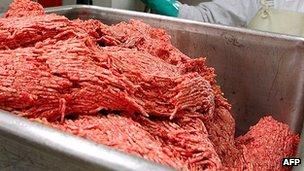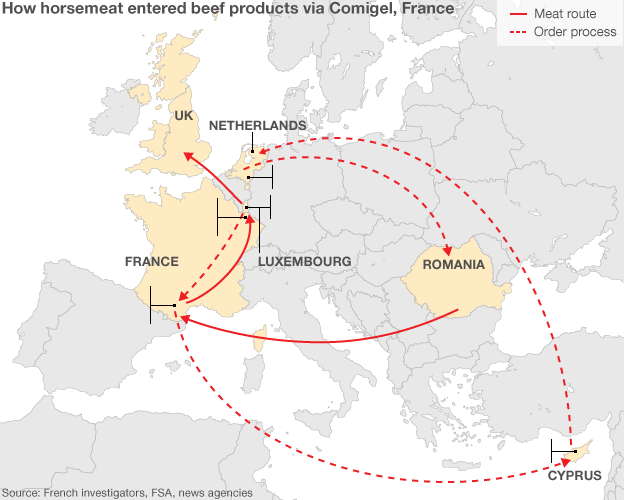Horsemeat scandal: Germany pulls lasagne off shelves
- Published

Officials are still trying to find out where the adulteration with horsemeat took place
Horsemeat has been detected in frozen lasagne on sale in Germany and supermarkets have started removing the product from their shelves.
The Real supermarket chain said it had withdrawn TiP frozen lasagne - the latest tainted processed food to figure in a Europe-wide scandal.
Other German retailers including Tengelmann and Rewe are now checking their processed beef products too.
The EU is urging member states to conduct random tests for horsemeat.
All members should carry out DNA tests on processed beef for traces of horsemeat for three months from 1 March, the EU health commissioner said on Wednesday.
German authorities suspect a batch of lasagne sent from Luxembourg to a retailer in the state of North Rhine-Westphalia.
On Wednesday the state's Consumer Affairs Minister, Johannes Remmel, said that "after analysing the data we have learned that through a middleman in Luxembourg, a significant amount of goods has been shipped to Germany and North Rhine-Westphalia, and those goods are suspected, and I repeat only suspected, to have not been properly labelled".
The shipment is believed to have taken place between November 2012 and January 2013.
Comigel connection
Mr Remmel said frozen processed foods had arrived in Germany, via Luxembourg, from Comigel - the supplier in northeastern France which sent mince containing horsemeat to several UK retailers.
The supermarket giant Tesco, frozen food firm Findus and budget chain Aldi received mince containing horsemeat from Comigel.
The French firm denied wrongdoing, saying it had ordered the meat from Spanghero, a firm in southern France, via a Comigel subsidiary in Luxembourg - Tavola.
The supply chain reportedly led back to traders in Cyprus and the Netherlands, then to abattoirs in Romania.
On Wednesday the EU Health Commissioner Tonio Borg said EU states should test not only for horsemeat but also for the presence of the veterinary medicine phenylbutazone ("bute"), thought to be potentially harmful to humans.
Mr Borg was speaking after a meeting with ministers from the UK, France and other affected countries in Brussels.
He said the programme of random tests should report after 30 days, but testing should continue for three months.
The scandal has raised questions about the complexity of the food industry's supply chains across the EU.
There are now calls for more specific labelling on processed meat products in the EU, to show country of origin, as in the case of fresh meat. But the cost of doing that may trigger opposition from food manufacturers.
Romania has denied claims that it was to blame for the mislabelling.
Germany's Consumer Protection Minister Ilse Aigner called the mislabelling situation "a mess" and said the EU must put an effective food surveillance system in place to detect fraud. Speaking on German ARD television, she stressed that it was a problem of fraudulent labelling, not public health.
 1. Comigel: Food processor
3. Spanghero: Meat processor
2. Tavola: Factory
4. Subcontractor
5. Trader
6. Abattoirs
7. Supermarkets
1. Comigel: Food processor
3. Spanghero: Meat processor
2. Tavola: Factory
4. Subcontractor
5. Trader
6. Abattoirs
7. Supermarkets
French food producer makes order
Comigel HQ in Metz, north-east France, asks its subsidiary, Tavola in Luxembourg, to make food products - including beef lasagne for Findus.
Factory orders meat
The Tavola factory orders the meat from Spanghero in the south of France.
Subcontractor used
Spanghero contacts a subcontractor in Cyprus to source the meat.
Subcontractor enlists trader
The Cypriot subcontractor in turn contacts a trader in the Netherlands.
Trader orders from Romania
The trader in the Netherlands places an order for meat with abattoirs in Romania.
Abattoirs send meat to France
The meat from the abattoirs travels to Spanghero in France. However, Romania rejects claims that it was responsible for wrongly describing the horsemeat from its abattoirs as beef. Horsemeat is always labelled as such, they say. The Romanian authorities claim records show orders had been for horse carcass - easily distinguishable from beef.
Meat used to make products
Spanghero sends the meat to the Comigel subsidiary’s factory in Luxembourg before the finished products are supplied to Findus and retailers across Europe, including the UK. The president of Comigel says the company was unaware the meat was coming from abroad.
Horsemeat found in Ireland and UK
Tests by Irish authorities have found equine DNA in beefburgers made by firms in the Irish Republic and the UK. Traces of horsemeat have also been found in stored meat at another plant in Ireland and one in Northern Ireland. In mainland Britain, police and officials probing alleged horsemeat mislabelling have carried out raids at a slaughterhouse in West Yorkshire and a meat firm near Aberystwyth. Three men were later arrested on suspicion of offences under the Fraud Act..